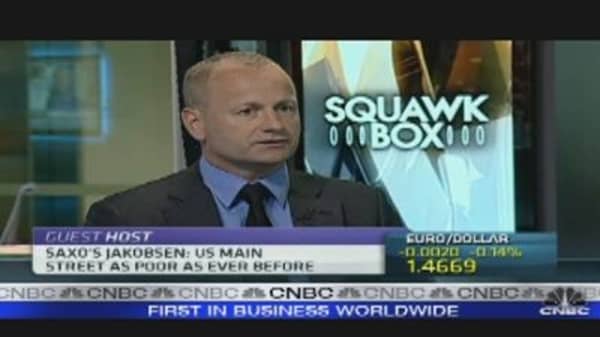The US economy could be facing a so-called Operation Twist rather than a third round of quantitative easing (QE3), a leading economist told CNBC Wednesday.
“We are getting ready for Operation Twist: not QE3 but something different,” said Steen Jakobsen, chief investment officer of Saxo Bank, the Danish investment bank.
"This will involve pinpointing the 10 year sector and taking the rates to 2, 2.25 percent and at the same time allow shorting to go up slightly. Bernanke has already addressed this in his famous 2002 deflation speech, although in a footnote," he said.
Operation Twist has been tried once before, with mixed success.
“During the Operation Twist of the 1960s, an attempt was made to raise short-term yields and lower long-term yields simultaneously by selling short-end and buying in the long-end.
“To flatten the yield curve – helping the housing market while supporting the US dollar - you only need to replace a falling US dollar with commodities,” he added.
The US Federal Reserve has already spent more than $2 trillion on two rounds of quantitative easing, by buying government bonds in an effort to drive down long-term interest rates.
Its current $600 billion round of government bond buying, called QE2, is due to end this month.
Fed Chairman Ben Bernanke said on Tuesday that the US economy had slowed but hinted that there would not be further quantitative easing.
“The US economy is recovering from both the worst financial crisis and the most severe housing bust since the Great Depression, and it faces additional headwinds ranging from the effects of the Japanese disaster to global pressures in commodity markets,” he said. “In this context, monetary policy cannot be a panacea.”
There are concerns in the market that the Fed is running out of methods to restore the US economy to health.
Recent data on US jobs and growth have failed to quell worries about the state of the economy.
The problems in the US economy have not gone away, Jakobsen told CNBC.
“The issue between Wall Street and Main Street is that it’s hard to get US consumers to continue spending," he said.
“The consumer is still going to restaurants but he isn’t going to shops or going on holidays. The Main Street has had a reality check,” he said.
The weakening US dollar will eventually make the US as competitive as Asia, Jakobsen believes.
"I travelled three continents in the last eight weeks and it’s very clear to me that if you look globally from 10,000 feet and lower you will find that Asia is now at max capacity, inflation is now much much higher, and you are relying on China to carry that market," he added.




